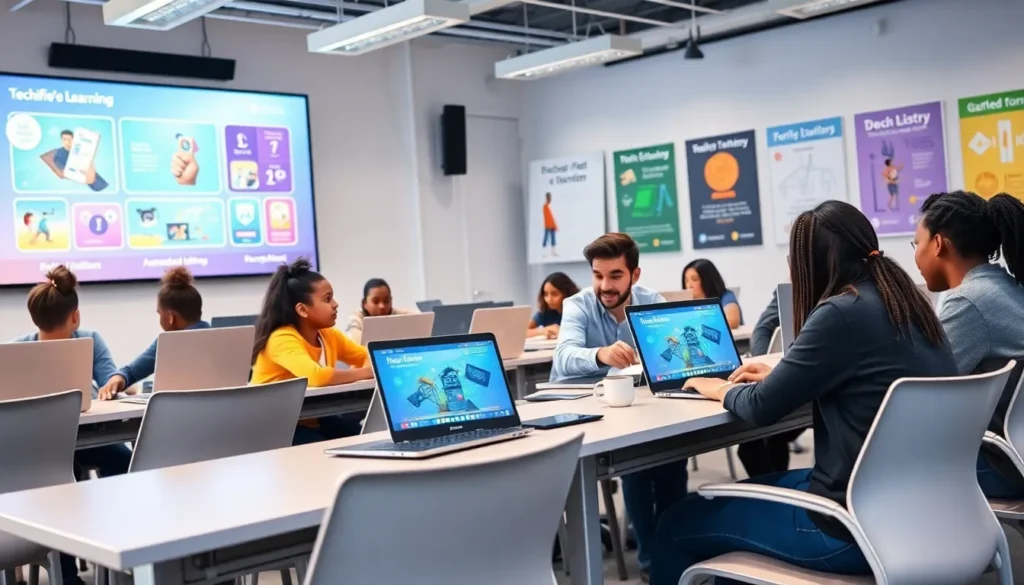Table of Contents
ToggleIn a world where textbooks are thinking of retirement and classrooms are more likely to feature screens than blackboards, the education technology (EdTech) industry is booming like a toddler on espresso. That’s right. Education isn’t just about sitting in a desk for eight hours anymore. This vibrant sector offers a smorgasbord of innovative tools and solutions to enhance the learning experience and engage students in ways previously unimagined. So, buckle up as we explore the top EdTech companies that are transforming how we learn, and maybe even making those last-minute cramming sessions a little less painful.
Overview of EdTech Industry

The EdTech industry represents a fascinating intersection of education and technology, where learning meets innovation. From digital classrooms to interactive learning platforms, it encompasses a wide array of tools designed to support both educators and learners. The rise of smartphones, tablets, and internet connectivity has catalyzed this transformation, allowing education to transcend geographic barriers. As of 2023, the global EdTech market is projected to reach a staggering $404 billion, demonstrating its increasing importance in contemporary learning environments.
The sector includes traditional educational institutions adopting technology-based methods, startups developing groundbreaking tools, and large tech companies branching into educational content. From K-12 students to higher education, EdTech solutions cater to various audiences, providing flexibility and personalization that traditional methods often lack.
Key Players in EdTech
Numerous companies have taken center stage in revolutionizing education. Among them, Coursera is a standout, partnering with universities to offer free online courses alongside more formal degree programs. Through its user-friendly platform, it enables learners worldwide to access quality education, making a global classroom a reality.
Khan Academy is another noteworthy contender, providing an extensive library of instructional videos and practice exercises at no cost. The platform empowers learners to take charge of their education by progressing at their own pace.
Then there’s Duolingo, the app that has made language learning feel more like a game than a chore. By using bite-sized lessons and gamified elements, it engages students and makes them look forward to language studies.
Finally, companies like Microsoft and Google are not just tech giants: they are also formidable players in EdTech. Both have developed tools tailored for education, like Microsoft Teams and Google Classroom, which help collaboration and streamline the learning process for teachers and students alike.
Innovative Solutions and Technologies
The EdTech landscape is rich with innovation, harnessing the latest technologies to enhance the learning experience. Artificial intelligence (AI) is making waves by personalizing education, analyzing data on student performance to deliver tailored content. Think of it as a GPS guiding students on their unique learning journeys.
Virtual reality (VR) and augmented reality (AR) are also transforming classrooms into immersive learning environments. Imagine students taking a virtual field trip to the Great Wall of China without leaving their classroom. These technologies engage learners’ senses, making complex subjects more relatable and intuitive.
Also, adaptive learning platforms like Smart Sparrow are customizing the educational experience based on the learner’s individual progress and needs. This level of personalization can dramatically improve engagement and retention, equipping students to succeed in challenging subjects.
Impact of EdTech on Learning Outcomes
The integration of EdTech tools in learning environments has the potential to significantly enhance educational outcomes. Studies show that students using digital tools often exhibit higher engagement levels and improved information retention. For example, interactive platforms that enable collaborative projects foster team-building skills and improve critical thinking.
Also, EdTech solutions like Learning Management Systems (LMS) provide teachers with valuable insights into student performance, helping identify those in need of additional support. These analytics not only allow for timely interventions but also create a more inclusive learning atmosphere where every student has the opportunity to thrive.
Besides, the flexibility offered by online courses allows learners to manage their time better, balancing education with personal or work commitments. This approach has proven particularly beneficial for adult learners and non-traditional students.
Challenges Facing EdTech Companies
Even though the rapid advancements and opportunities in the EdTech sector, several challenges remain. One of the foremost hurdles is achieving equitable access to technology. While some students benefit from cutting-edge tools, others struggle with inadequate resources, leading to a digital divide that can hinder educational progress.
Also, the effectiveness of EdTech solutions hinges on educators’ readiness to carry out and embrace these technologies. Professional development and training are crucial to ensure educators feel confident and capable in integrating new tools into their teaching.
Also, data privacy concerns raise alarms among parents and educators alike. As platforms collect vast amounts of student data to personalize learning experiences, it’s necessary to address these vulnerabilities to build trust in the technology.
Future Trends in EdTech
As the EdTech industry continues to evolve, several trends are emerging that suggest what the future may hold. For one, the rise of blended learning models is set to redefine traditional teaching methods, combining the best of both online and in-person education.
Besides, as remote and hybrid learning become part of the educational landscape, an increase in demand for high-quality online resources is inevitable. Expect to see more interactive, engaging content that captures learners’ attention and encourages critical thinking.
Investment in AI-driven tools will likely skyrocket, helping educators create more personalized learning experiences. The future may also hold an expansion of education beyond K-12, with adult education programs receiving increased attention and innovative approaches.







